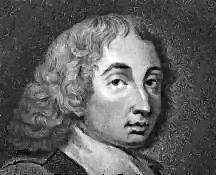Blaise Pascal
(1623-1662)
MATHEMATICIAN, PHYSICIST, THEOLOGIAN
Picture
from: http://www-etsi2.ugr.es/alumnos/mlii/imagenes/Blaise%20Pascal.jpg
BACK HOME NEXTBlaise Pascal was born in Clermont-Ferand, in central France 1623. He was educated by his father, Etienne, along with his two older sisters. He wasn't allowed to study mathematics until he showed his father he could work out Euclid's geometric propositions at the age of eleven.
Etienne was a tax collector for Upper Normandy. After having trouble with some calculations, Blaise invented a device for helping with the calculations consisting of a series of rotating discs.
Blaise discovered that vacuums can and do exist above the mercury in a barometer. He shared this knowledge with Rene Descartes. Descartes however did not like the idea of a vacuum, and determined that Pascal had "too much vacuum in his head" (J J O'Connor and E F Robertson). With his new knowledge, Pascal determined that there must be a vacuum above the atmosphere. His experiments with pressure and barometers led him to develop Pascal's Law.
Pascal's triangle was known before his time, but the papers he published on the binomial coefficients were the most important on the topic. His research also lead Isaac Newton to develop the binomial theorem.
After a near death experience, Pascal pledged his life to Christianity. Writing several papers on the subject anonymously.
Pascal's final project was studying the cycloid, the curve made by a point on a rolling circle. He determined the surface area and volume of the solid of rotation about the x-axis, the center of gravity of any segment, and various other properties.
In 1662, Pascal died of a malignant growth in his stomach that spread to his brain. He suffered intensely for many years until his death. His last work was published eight years after his death.
